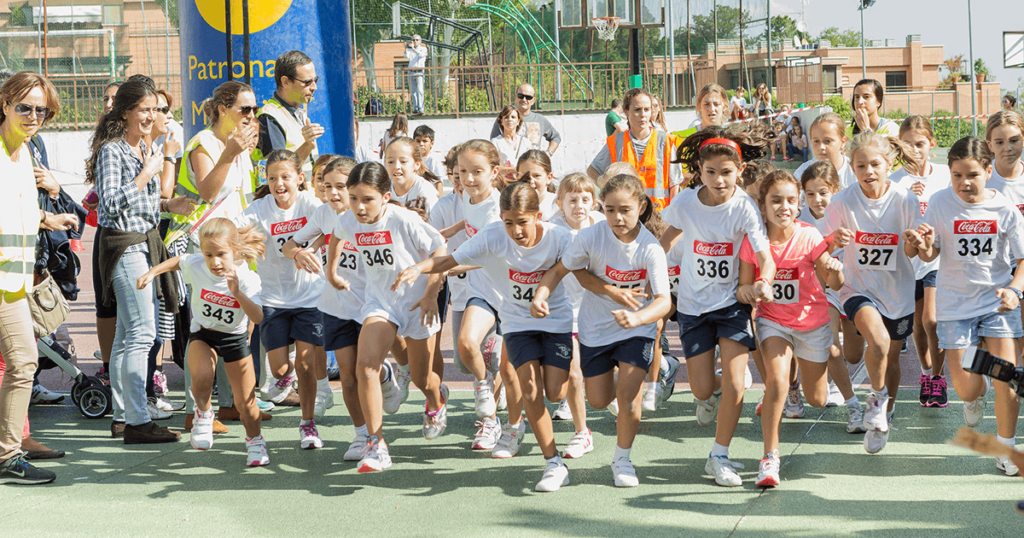
I’ve never wondered what a wink means. Fun, secrets, sharing—all of that is implicit. A frown is a little harder to interpret, meaning sometimes confusion, sometimes anger, and on the face of a three-year-old this past month in the town of La Caridad, pure feistiness. Her parents were cajoling her to line up with the other tots for a race, but the more they said, the more determined she was to resist. Will she or won’t she? was the question put to the father. He answered with a shrug. “She’ll do as she pleases,” he said. “She always does.”
Half the fun of community road races, ever more popular in Spain, is watching parents with their children. Usually several short races for the children precede the adult category, when parents have a chance to demonstrate good sportsmanship and even athletic excellence to their offspring. Victorious parents will often climb the podium to receive a trophy with one or two of their children at their side. If a child doesn’t want to go, the parent will, like the father above, most likely shrug, this time meaning “That’s okay.” When children are too busy playing to take note of a parent’s success, a shrug says, “What else is new?” For the father of the three-year-old, it was plainly “What can you do?”
At another race on another day I stood in a crowd on a bit of grass beside the village bar while children received medals for participation and, for the top three finishers in each age group, trophies. Children appeared as their names were called. For the 8- and 9-year-old girls, the third-place finisher climbed up onto the podium, hers the lowest of the three side-by-side cubes, the highest one being in the middle.
When the second-place finisher was called, a protest rang out from a group of parents standing a few steps back. “No, no,” someone said, “that’s wrong.” She had in truth finished first. Their voices were lost in the general hubbub, and although the announcer paused, a child was already clambering into place on her cube, and so he continued, reading the name of the first-place finisher, who had finished second, to renewed clamor from the parents. They were standing right in front of me. It was their daughter coming from a group of friends toward the podium.
She stepped onto the edge of a lower cube and then put her foot onto the top cube. Over her shoulders she shot a glance half-abashed, half-accusing at her parents, who were calling out to her. “Switch!” they said, motioning with their arms. “Switch places!” People were milling about, in and out of the bar, sipping bottles of beer, leaning on a wall, talking, joking, some paying attention, some not. The other two girls on the podium were staring straight ahead, with curiously blank expressions. Again, the couple called to their daughter, and she, turning on the highest cube to face the small crowd, nodded her compliance. “Yeah, yeah, I know.” Then in a gesture of helplessness, she shrugged.
“Switch!”
“Yes, okay.” She sounded willing, she sounded eager. Vale is the word in Spanish for okay, and she said it again to her gesturing parents.
“Switch! Now!” insisted the father. He turned to the mother and said, more amused than disgruntled, “Why doesn’t she do it?” The mother leaned towards him to say something, and he laughed.
The girl gave them another helpless look and shrugged again, as if to say—what? That she was trying with all her might to do this thing physically beyond her power, like lifting a huge weight, or resisting a strong current. She seemed to be pleading with her eyes: What good was it to keep trying? It wasn’t working, nothing was happening, couldn’t they see?
Her hair was long and braided. Her mix of embarrassment and pleasure, helplessness and desire, made her appealing. She gazed over the 40 or 50 people standing in a semicircle around the podium. Deserved or not, she was at the top, looking down on her friends, rivals, and parents. The village official approached, holding out a trophy, and, smiling graciously, she accepted it. Over the man’s head she caught her parents’ eye again, once more signaling helplessness. That was the astonishing switch—from triumphant to vulnerable.
The parents stopped laughing as their daughter turned a questioning look on the rightful winner, who seemed just as uncertain about what to do. One girl gingerly put a foot out, the other did the same, one stepped up, and the other down, together managing the feat while the parents joked about how easy it was to make the mistake, how simple the mistake was to correct, but how difficult it was to want to do it.

